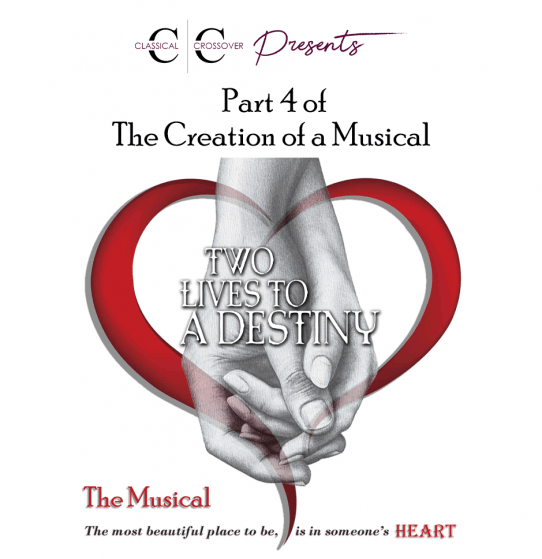Author of “Two Lives to a Destiny”
Edited by Vaughn Harbin.
Flashback
Parts 1 through 3 recounted…
- I began playing piano at 30 years old and quickly became very good at it.
- 5 months later, played “Moonlight Sonata” and my own sonata called “The Dream” at my first recital.
- Traumatized by this event, an old wound came back to life and unfortunately, the idea of becoming a pianist was no longer possible.
- As fate would have it, selling my piano suddenly became a really bad idea, but life had its way of correcting this mistake
Part Four – The Awakening
Can passion be revived? I believe passion never dies; it’s more like you’re stuck with it for life. It’s an entity that develops and becomes part of oneself so that you can never really get rid of it unless you’ve proven to yourself that you’ve done absolutely everything possible to be entirely fulfilled. In other words, you’ll spend a lifetime trying to satisfy this passion, regardless of the weight you put upon yourself. There are really only two ways to live out your passion; you’ll finally become successful in driving this passion to where its purpose lies, or you’ll keep trying until your dying breath. Although passion is a driving factor, it does need to take a break occasionally, especially when things go dark around you. Negativity and passion are total opposites and cannot share the same stage, but passion is patient, and it will wait for the dark cloud to go away before resurfacing.
Year 2002; I was home alone with myself. I did see my children on weekends which brought me a lot of joy, pretty much the only joy one was blessed with as a result of a nasty divorce. Nevertheless, my world had been torn apart regardless of right or wrong, and had become a lonelier place in which to live. The hardest part after getting used to not having the kids around full-time was living life by myself. However, by 2002, I had been living alone for three years or so, and I had kind of got used to it. When your heart is broken and the clouds have darkened, life becomes a day-to-day challenge. One should not, however, despair. The sun does shine again.
That sunny day did finally come around in a way that I would never have expected. It was the Christmas holidays of 2002. Alone and extremely bored, I decided to jump into my car to go see a movie. I had no specific film in mind, and didn’t even check what was playing at the theatre. Whatever movie was beginning when I arrived at the theatre would be the one I’d be watching. By the time I got to the theatre, a drama called Séraphin: un homme et son péché, original French version of Séraphin: Heart of Stone, was about to begin. This was not quite compatible with the idea I had before leaving home. I was most definitely not a fan of watching dramatic or romantic movies in a theatre. I was okay with watching this genre at home but not in a theatre. I’m an all action/adventure movie watcher in theatres, and naturally, that’s what I had in mind before leaving the house. When the girl at the ticket stand saw my reaction as she told me what movie was playing next, she interjected an “Oh my!” as in, “Buddy, you want to see this!” She followed with a brief synopsis which went like this, “A young woman is forced to marry a greedy old man to save her father from bankruptcy although she has secretly promised her heart to the man she loves”. Believe me, the synopsis did not seal the deal, but the passion with which she spoke about the story did.
I don’t know if I should say this but if there’s anything that would be classified as good trauma therapy, this film would be it. This movie simply turned my world upside down. And watching it in a theatre made the experience much more realistic than watching it on TV. This day became one of the saddest, yet most inspiring days of my entire life.
But there was even more to this movie. The theme music, composed by Michel Cusson and titled “Reverie”, couldn’t have been more perfect for this genre of movie. This was the kind of music you wanted to listen to over and over until it broke you, but it also had you longing to repeat the process. If this were not enough, Isabelle Boulay, one of Quebec’s most acclaimed female artists, interpreted the piece of music with lyrics called “Depuis le premier jour”. This was quite the experience! I didn’t simply watch this movie passively at the theatre; I felt as though I lived it in real-time until it ended.
Hence, the aftermath of getting emotionally involved in, what I call, an excellent movie… Two Lives to a Destiny was brought to life, commencement date, spring 2003. I loved how the movie, Séraphin: Heart of stone, was able to pull me in emotionally so much that I wanted a story, with music, for myself. My inspiration for creating a story with a music soundtrack came from this particular moment in my life, and I would love to thank the cast and crew of Séraphin: un homme et son péché, for making such a wonderful movie. For all the people who haven’t seen this movie or listened to the music, I highly recommend that you do. Just keep in mind, it’s a heart squeezer.
So, now that you know where the inspiration came from, in the next edition of Classical Crossover Magazine, I’ll show you how I worked around a little handicap to get the music done. I’ll even include a link to one of my favorite pieces I composed for Two Lives to a Destiny in 2003.
Stream Two Lives to a Destiny Original Novel Soundtrack









